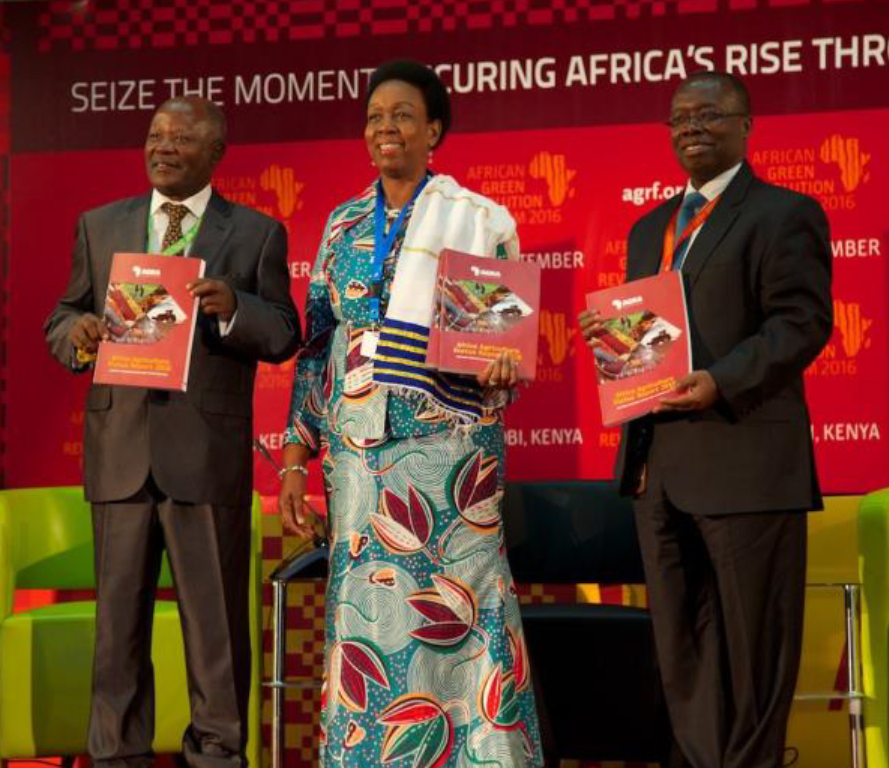African Countries that implemented CAADP earlier, have higher agricultural productivity and GDP growth, 2016 agriculture report states
Nairobi, 7th September 2016 – “Countries that have implemented the Comprehensive Africa Agriculture Development Programme (CAADP) have posted higher agriculture productivity and stronger GDP growth as well as sharper declines in malnutrition compared to countries that have not adopted it.” This is contained in the Alliance for a Green Revolution in Africa (AGRA)’s 2016 African Agriculture Status Report (AASR) that was released today during the 2016 AGR Forum.

H.E. Tumusiime Rhoda Peace, AUC Commissioner for Rural Economy and Agriculture, Dr, Namanga Ngongi, Chairman of the Board of Trustees, Africa fertilizer and Agribusiness Partnership and former AGRA President and AGRA’s Head of Monitoring and Evaluation, Dr. David Ameyaw launched the report yesterday.
The document provides a detailed analysis of an impressive and progressive decade of African agriculture.
Commissioner Tumusiime said, “The report shows the steady and impressive impact that CAADP has had over the last decade and how countries are benefitting from it, with the Malabo Declaration now on board, we can only move forward and seize the moment for agricultural transformation.”
“The last ten years have made a strong case for agriculture as the surest path to producing sustainable economic growth that is felt in all sectors of society—and particularly among poor Africans,” said AGRA President Agnes Kalibata. “The track record is far from perfect,” she added. “Many governments face significant budget constraints and far too many farming families continue to lack basic inputs, like improved seeds or fertilizers. But the evidence is clear. When we invest in our farmers and in the all the things they need to succeed, good things happen across the economy.”
According to AGRA, the report finds that “after decades of stagnation, much of Africa has enjoyed sustained agriculture productivity growth since 2005, and as a result, poverty rates have declined in places like Ghana, Rwanda, Ethiopia and Burkina Faso.
CAADP which was endorsed by AU Heads of State and Government in 2003, among other requirements calls for African governments to allocate 10 percent of their national budgets to agriculture and to aim for six percent annual growth in the sector.
The AGRA report states that early adopters of the CAADP goals have seen productivity on existing farmlands rise by 5.9 to 6.7 percent per year. This boost in turn helped spur a 4.3 percent average annual increase in overall GDP. Countries that signed on to CAADP later, achieved anywhere from a 3 to 5.7 percent growth in farm productivity and a 2.4 to 3.5 percent increase in GDP.
Meanwhile, countries on the sidelines saw farm productivity rise by less than 3 percent and GDP rise by only 2.2 percent.
The trend, AGRA states, is similar for declines in malnutrition, with countries that have embraced the CAADP process experiencing annual declines ranging from 2.4 to 5.7 percent, while those who have not averages only a 1.2 percent decline.
The report acknowledges that the 2014 AU Malabo Declaration on agriculture has significantly expanded the CAADP agenda in terms of thematic coverage and mutual accountability in countries.
The report further states that in as much as there has been progress in agricultural development in countries, much more needs to be done to sustain and deepen the agricultural transformation process as laid out in the Malabo Declaration and requires countries to redouble their efforts to effectively address key challenges such as; meeting funding targets, enhancing technical and institutional capacities and improving inter-ministerial coordination, among others.
The AGRF 2016, under the theme, “seize the moment” has brought African leaders to advance policies and secure investments that will ensure a better life for millions of Africa’s farmers and families.
A major highlight of the forum will be the inaugural award of the new Africa Food Prize which was created to call attention to individuals and institutions that are inspiring and driving agriculture innovations that can be replicated throughout Africa.
#
For more information please contact:
Ms. Carol Jilombo
CAADP Communications Officer
Department of Rural Economy and Agriculture
JilomboC@africa-union.org
For further information:
Directorate of Information and Communication | African Union Commission I E-mail: DIC@africanunion.org I Website: www.au.int I Addis Ababa | Ethiopia
Follow us
Facebook: https://www.facebook.com/AfricanUnionCommission
Twitter: https://twitter.com/_AfricanUnion
YouTube: https://www.youtube.com/AUCommission
Learn more at: http://www.au.int

